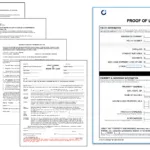Filing a homeowners or property insurance claim can be frustrating. Jumping into a claims process and dealing with insurance companies, adjusters, contractors, or attorneys immediately after your property is damaged can be a headache. Having your property damaged is already frustrating, and making an insurance claim and following it through to payment can be tedious. It’s not something you do every day, and it’s subject to nuanced and hard to understand state laws and regulations, as well as complicated policy terms. The good news, through, is that Ohio has protections for policyholders built into the insurance law, and the insurance regulations provide strict deadlines and requirements for the investigation and payment of property insurance claims. If policyholders are aware of these deadlines and rules, and are proactive with respect to their claims, they should have a smooth, fast, efficient, and fair insurance claim process.
These resources are built to help policyholders — and all the stakeholders who work with them, like adjusters, attorneys, contractors, and consultants. These resources will help you file your claim correctly, document your losses thoroughly, and know when and how to followup through the claim process. And, if necessary, how and when to escalate and resolve the claim.
Claim Filing Deadline
Reasonable time
Ohio insurance law states that a policyholder must only give notification of loss to the insurer within a reasonable time from when they knew or should have known of the loss. Any delay in giving the notification must be an unreasonable delay in order for the claim to be denied. Note, however, that some policies still contain a specific deadline, and compliance with the policy deadline can reduce headaches in making a claim.
Initial Response Time
15 days
Ohio requires insurance companies to acknowledge property insurance claims within 15 days after receiving notification of the claim.
Claim Decision Time
21 days
Ohio generally requires that an insurance company accept or deny a claim within 21 days of receipt of a properly executed proof of loss. Note, however, that this deadline can be extended with written notice and justification of why additional time is required.
Lawsuit Deadline
Generally set by policy
Ohio allows insurance companies to shorten the statute of limitations with respect to filing a lawsuit. While the general limitation on filing a breach of contract suit in Ohio is 6 years, the Ohio Supreme Court has upheld the ability of an insurer to limit the time period to 1 year after the date of loss or damage, so accordingly, many do.
State Department
Ohio Department of Insurance
Ohio Department of Insurance
50 W Town Street
Suite 300
Columbus, Ohio 43215
Phone
Comsumers: (800) 686-1526
Fraud & Enforcement: (800) 686-1527
Ohio Department of Insurance website
File your Claim Now with ClaimSpot
ClaimSpot guides you through a quick, secure, and effortless filing experience.
It’s free. Let ClaimSpot Make Your Claim Fast & Easy.
Ohio Insurance Claim Guide
Filing: Ohio Insurance Claim FAQs
All insurance claims start by informing your insurance company of the loss. You want to do this as soon as possible. There are many ways to notify the insurance company. It’s most important that you keep a record of notifying them. Here are frequently asked questions about how to best “file your claim” with the insurance company in Ohio and the state regulations that will help (or hurt) you!
In order to initiate a claim under a property insurance policy in Ohio, the policyholder must inform their insurance carrier of the loss (either directly or through their agent), and that they are making a claim. This means that the only requirement to initiate the process is that the insurance carrier is informed that there has been a loss, some details about the loss, and that the policyholder wants to make a claim.
In many cases, an insurance company will call this communication a first notice of loss, or FNOL. In Ohio, insurance laws call this communication a “notification of claim.” A Notification of Claim in Ohio is specifically defined as: “any notification, under the terms of an insurance contract, to an insurer or its agent, by a claimant, which reasonably apprises the insurer of the facts pertinent to a claim.” Note that the definition states that the notification must be “under the terms of an insurance contract” so the policy itself provides guidance for making a claim.
Most insurance companies provide multiple ways to contact them after a loss to begin the claims process, these usually include:
a. Phone call (a number is usually provided on the insurance company’s website);
b. Online portal – many insurance companies have an online form to notify the claims department of a loss, this may even be through a mobile app;
c. Your agent – many insurance companies even have a different section of their website or phone number for an agent to inform them of a policy-holder’s loss;
d. Online software as a virtual assistant.
While it is easy and quick to start a claim, claimants need to continue to follow-up and provide more information. In many cases, the insurer will require more information and supporting documentation, including specific forms, to actually process and adjust the claim. These specific necessary forms should be provided to the claimant by the insurance company.
1. Promptly inform your insurance carrier of the loss (see above);
2. As soon as possible begin to mitigate the damage – protect the property and secure it against further damage as soon as it is safe and possible to do so.
3. Cooperate with your insurance company and communicate with them (and keep copies of all correspondence).
4. Make your property available for inspection as soon as it is safe and possible to do so.
5. Prepare supporting documents for your claim including:
– Inventory list;
– Description of damages;
– Photographs and/or videos of the damage;
– Receipts; etc.
Reporting Deadline: Ohio insurance law states that a policyholder must only give notification of loss to the insurer within a reasonable time from when they knew or should have known of the loss. Any delay in giving the notification must be an unreasonable delay in order for the claim to be denied.
Note, however, that many policies include language that may differ from the general statutory requirements. This does not necessarily mean that the policy would ultimately be held enforceable by the courts if a claim was denied pursuant to a shorter time frame, but it does mean that if a claim isn’t made within the policy-set time period it may be denied and require a lawsuit to get the coverage. In fact, some Ohio policies include language that requires a property damage claim caused by wind or hail to be made within 6 months of the damage, not from when the policyholder knew that damage occurred (whether the policyholder knew that damage occurred during the storm or not).
That being said, however, it is always best practice to inform an insurance company of the losses sustained and that a claim is being made as soon as it is reasonably possible to do so after the damage is incurred and a determination that a claim will be filed is made. While it is never a good idea to delay in providing the insurance company with information once it has been determined that a claim will be filed, the actual meaning of “immediate” or “prompt” or “reasonable” with respect to making a claim depends on the circumstances – if a home is completely destroyed by a storm and the phones, internet, and power are off, it may take a little longer to make the claim.
Be sure to check the language of the insurance policy to determine the notification or reporting deadlines in order to avoid a fight about coverage later, and remember that best practice is to provide notice of the loss and claim to the insurer as soon as possible.
Followup: Document Your Ohio Insurance Claim FAQs
Notifying the insurance company about a loss is just the first step. The most important work comes next: documenting your loss and following up with the carrier. Ohio has enacted many regulations to guarantee that the insurance company acts moves promptly and fairly to investigate and pay your claim…but you need to understand these regulations and know the appropriate timeframes. That means communicating with the insurance company early and often and putting them on the clock. These FAQs will let you know the applicable standards.
Documentation Deadline: Ohio does not set a specific deadline to provide support for a claim by statute, but instead allows this timeline to be set by the policy itself. Generally, Ohio property insurance policy requires that a proof of loss document be provided within 60 days of when requested by the insurance company.
In any event, the deadline for submitting a proof of loss may be extended by agreement between the parties if circumstances make it difficult or impossible for the policyholder to comply with the deadline as set forth by the policy. Ohio insurance law also requires that an insurer “immediately provide the claimant with the specific documents and specific instructions” if the specific form and execution of a proof of loss document is material to the insurer. If the insurer fails to do so, the insurer is disallowed from denying any claim solely because the proof of loss provided is not on their usual or customary form.
Note, however, that no matter the actual deadline for providing supporting documentation, it is always best practice to provide a proof of loss document and support of the claim as soon as possible (while noting that the document only presents the knowledge at the time and may be amended or updated). Some deadlines for Ohio insurance companies to accept or deny claims, and to pay the claims start from receipt of a “properly executed proof of loss” so getting a proof of loss to the insurer quickly can be a good way to jumpstart the claim process and get the clock ticking on payment.
Ohio has adopted laws governing unfair claims settlement practices to protect policyholders and to provide a streamlined timeline for claims to be handled, and these laws provide deadlines for the acknowledgment and processing of claims.
Deadlines for Acknowledgment: Ohio requires insurance companies to acknowledge property insurance claims within 15 days after receiving notification of the claim. The 15 day period is measured by calendar days, but if the last day of the period falls on a Saturday, Sunday, or holiday to deadline is extended to the next calendar day that is not a Saturday, Sunday, or holiday.
An “acknowledgement” of the claim in Ohio can be any of the following:
(1) A statement made to the claimant advising receipt of the claim / that the claim is being investigated.
(2) Payment of the claim.
(3)Providing necessary claim forms and complete instructions to the claimant.
Deadlines for Investigation: Ohio doesn’t really provide a specific breakdown of the time to begin an investigation of the claim, other than by inference of when an investigation of a claim is supposed to be completed. However, Ohio law does require that insurance companies “adopt and implement reasonable standards for the prompt investigation and settlement of claims.”
Ohio requires insurers to acknowledge communications with respect to claims within 15 days of receipt of the communication when the communication suggests that a response is appropriate. Note, however, that if the “communication” is a complaint filed in court, the insurer is not required to respond within the 15 day time period and instead is governed by the court’s rules of procedure.
Resolving: Get Paid & Protect Your Rights On Ohio Insurance Claim FAQs
Ultimately, the insurance claim must be approved and paid (or, unfortunately, denied). Getting to this step and getting the money has a lot of logistics…and that is if everything goes well. If all or any portion of the claim is debated (which is really common) then you need to escalate it. In either event, Alabama has regulations governing these timelines to guide the way. These FAQs show what is supposed to happen.
Deadline for Acceptance/Denial: Ohio requires that an insurance company accept or deny a claim within 21 days of receipt of a properly executed proof of loss.
If additional time is needed to complete the investigation in order to determine whether the claim will be accepted or denied, the insurer must notify the policyholder within the 21 day period and give an explanation of why more time is needed. While the investigation is ongoing, “the insurer has a continuing obligation to notify the claimant in writing, at least every 45 days, of the status of the investigation and the continued time for the investigation.”
Ohio requires that insurers make payment to the policyholder within 10 days of acceptance of a claim when the claim amount is determined and not in dispute.
If an insurance company is determined to be in violation of the unfair claims settlement practices requirements, the insurer is subject to penalties. While the unfair trade practices requirements do not create a private right of action (the ability for a policyholder to sue the insurance company directly for breach) the policyholder can complain to the state insurance department and the insurer can be penalized.
Additionally, insurers have a requirement to act in good faith in investigating and settling the claim. A policyholder may file suit against the insurer if they believe the insurer has acted in bad faith. In order to establish an insurer’s bad faith the claimant must show:
(1) The insurer refuses to pay the claim;
(2) The refusal to pay the claim was not predicated upon circumstances that provide a reasonable justification to do so.
In Ohio, if an insurer is liable for a bad faith refusal to pay a valid claim, the policyholder can recover the value of the claim improperly withheld, as well as other compensatory damages stemming from the denial of the claim. Note that attorneys’ fees are not automatically given even if the insured is successful in the bad faith claim. In order to be awarded attorneys’ fees, the insured must also show that punitive damages are appropriate. In Ohio, punitive damages are appropriate when the insured shows “proof of actual malice, fraud or insult on the part of the insurer” including if an insurer’s investigation was so one-sided it breached it’ duty to investigate adequately.
Deadlines to File Suit: Ohio allows insurance companies to shorten the statute of limitations with respect to filing a lawsuit. While the general limitation on filing a breach of contract suit in Ohio is 6 years, the Ohio Supreme Court has upheld the ability of an insurer to limit the time period to 1 year after the date of loss or damage, so accordingly, many do.
Note, however, that Ohio courts have also held that an insurance company may waive the limitation deadline set forth in the policy by certain acts or declarations, including:
a) acts or declarations which evidence a recognition of liability, or
b) acts or declarations which hold out a reasonable hope of adjustment
when which acts or declarations occasion the delay by the insured in filing an action on the insurance contract until after the period of limitation has expired.
So, there may be hope in extending the limitation period in certain circumstances based upon the actions of the insurance company.












